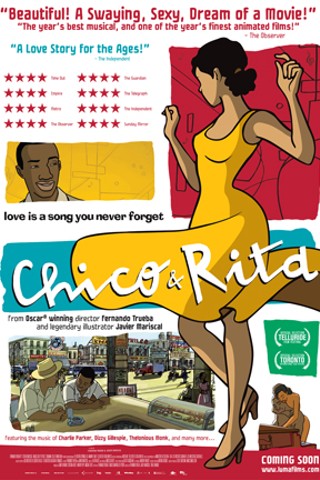There would be no crime in Rango winning Best Animated Feature at the Academy Awards. It has a cool, distinctive visual style, weird characters and a subversive nature. A Rango win would actually do animation in general a spot of good, because it would advance the notion that Hollywood doesn't need to tailor every cartoon to 6-year-olds.
Looking at the competition, you might say it's a runaway; there's nothing original or particularly noteworthy about Puss in Boots or the disappointing Kung Fu Panda 2 (although it did have nice alternate animation sequences), and the other two finalists—Chico and Rita and A Cat in Paris—are foreign films.
But Chico and Rita has qualities similar to Rango: Its visual style is decidedly its own, and it is subversive enough to have—gasp!—more than one scene of nudity. Will Oscar voters deem that inappropriate for "animated" films, which typically has meant "family-oriented"? One thing Chico and Rita has over all its fellow nominees is that this same film could exist and be very, very good without animation. This is a live-action story ... which just happens to be hand-drawn.
Chico (the voice of Eman Xor Oña) is an aging shoeshine man now, but 60 years ago, he was a dashing piano-player riding the rising tide of Cuban jazz in Havana. Talent is a magnet for talent, so he crosses paths with an aspiring young singer named Rita (Limara Meneses). Beautiful as she is, Chico is only interested in her voice—at first. Together, Chico and Rita have remarkable chemistry. When he plays, and she sings, it's magic.
Soon, they fall in love, but it's an appropriately dangerous love for a pair of hot-tempered musicians. They break up, make up and still manage to perform together at the top of their games. But Rita's compass is pointed toward stardom, and when she sets her sights on Broadway, Chico makes his way to New York with less professional success—and their give and take begins all over again.
The plot is not really a page-turner; it's a good chance to set star-crossed lovers in pre-Castro Cuba (we do get a hint of the revolution as the story moves forward), and some of the dialogue is memorable, but as a story, it is admittedly lightweight. But there is a tremendous soul in the colors and the animation style in general; in some scenes, it evokes the emotions for the audience when the screenplay falls short.
Cuban jazz is alive and well in Chico and Rita, perhaps even more than you might expect. As much as this is a love story, its focal point is a love affair with a musical culture and artists like Chano Pozo, a percussionist for Dizzy Gillespie whose untimely death makes for a pivotal scene in the film.
One of the many disappointing aspects of the rise of Castro is the stranglehold it placed on exporting and fostering Cuban art. There are several stories of musicians who all but vanished after 1960, because they could not leave Cuba, and the communist regime closed the night clubs and essentially made all musicians state employees, forcing them to play what Castro wanted—and that wasn't jazz. The stance softened after about 30 years, but think—for example—of how much relevance the musicians in the Buena Vista Social Club could have attained in a free society.
One such musician is Bebo Valdés, whose journey served as the inspiration for Chico. The pianist is considered one of the giants of Afro-Cuba jazz, but lost an outlet in 1960s Cuba and didn't record a note again until 1994 ... in Sweden. He is relevant here for another reason: Valdés, now 93, composed the score and performed the soundtrack for Chico and Rita, which—coupled with the imaginative animation—makes this film truly distinct.
So ... if you had an Oscar ballot, and it was between another Johnny Depp success story and Bebo Valdés, what would get your vote?











